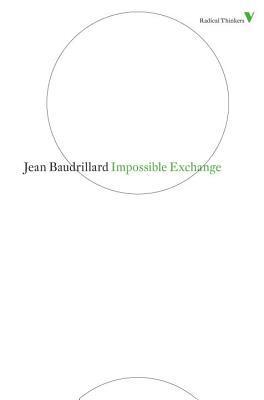

Impossible Exchange
3.98(312 readers)
Jean Baudrillard's now familiar investigations into reality and hyper-reality shift here into a more metaphysical frame.
Working his way through the various spheres and systems of everyday life—the political, the juridical, the economical, the aesthetic, the biological, among others—he finds that they are all characterized by the same non-equivalence, and hence the same eccentricity. Literally, they have no meaning outside themselves and cannot be exchanged for anything. Politics is laden with signs and meanings, but seen from the outside it has no meaning. Schemes for genetic experimentation and investigation are becoming infinitely ramified, and the more ramified they become the more the crucial question is left unanswered: who rules over life? Who rules over death? Baudrillard’s conclusion is that the true formula of contemporary nihilism lies here: the nihilism of value itself. This is our fate, and from this stem both the happiest and the most baleful consequences. This book might be said to be the exploration, first, of the ‘fateful’ consequences, and subsequently—by a poetic transference of situation—of the fortunate, happy consequences of impossible exchange.
Working his way through the various spheres and systems of everyday life—the political, the juridical, the economical, the aesthetic, the biological, among others—he finds that they are all characterized by the same non-equivalence, and hence the same eccentricity. Literally, they have no meaning outside themselves and cannot be exchanged for anything. Politics is laden with signs and meanings, but seen from the outside it has no meaning. Schemes for genetic experimentation and investigation are becoming infinitely ramified, and the more ramified they become the more the crucial question is left unanswered: who rules over life? Who rules over death? Baudrillard’s conclusion is that the true formula of contemporary nihilism lies here: the nihilism of value itself. This is our fate, and from this stem both the happiest and the most baleful consequences. This book might be said to be the exploration, first, of the ‘fateful’ consequences, and subsequently—by a poetic transference of situation—of the fortunate, happy consequences of impossible exchange.
Publisher
Verso
Publication Date
1/16/2012
ISBN
9781844677917
Pages
160
Categories
About the Author

Jean Baudrillard
Jean Baudrillard was a French sociologist, philosopher and poet, with interest in cultural studies. He is best known for his analyses of media, contemporary culture, and technological communication, as well as his formulation of concepts such as hyperreality. Baudrillard wrote about diverse subjects, including consumerism, critique of economy, social history, aesthetics, Western foreign policy, and popular culture. Among his most well-known works are Seduction (1978), Simulacra and Simulation (1981), America (1986), and The Gulf War Did Not Take Place (1991). His work is frequently associated with postmodernism and specifically post-structuralism. Nevertheless, Baudrillard had also opposed post-structuralism, and had distanced himself from postmodernism.
Questions & Answers
Reader Reviews
Loading comments...